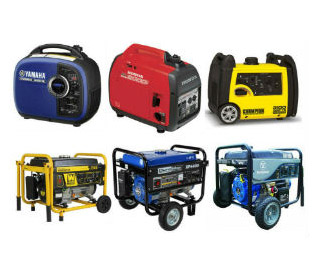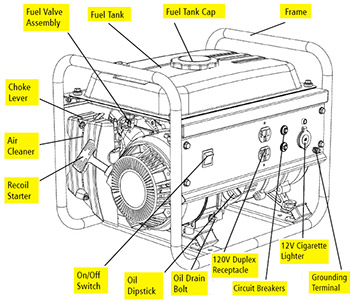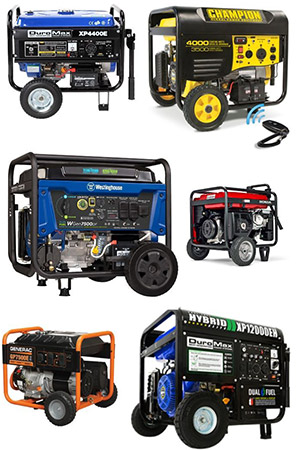Determining the right sized generator with a proper power supply capacity and a combination of advanced technology and cost-efficient fuel inputs is the key parameter while choosing a generator. No matter if you need a generator for home use, construction sites, infrastructure projects, or outdoor events, it’s always better to look for the best dual fuel portable generator.
A dual fuel generator will cut your costs on input purchases such as gas, diesel, and propane. Moreover, the portability feature of a generator will help you for easy lifting and moving. So if you want to know more about how to choose a generator, we would suggest you read this article till the end.
Why Own A Generator?
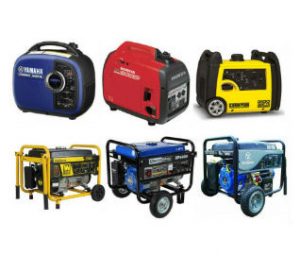
The power outage forces you fall into some deep troubles such as disruption in your home or business work, cut into precious hours in the construction sites or infrastructure projects, dramatic fall in the production of manufacturing industries, etc. The situation reaches its worst when a power outage occurs during any medical operation or electrically powered medical procedures. Hopefully, you got to understand why do people use generators or why to have a backup generator is a lifesaver for us.
What Is A Generator And Its Types?
A generator is a backup power supply that converts various fuels such as gasoline, propane, diesel, etc. into electrical energy. Electric generators are very much essential for home, business, commercial, and medical uses. A generator is the best alternative to provide you uninterrupted power supply when you have power outages. This electric generator comes with a variety of types, size, power, and efficiency, etc. Usually, there are three basic types of generators available in the market.
Inverter Generator:
The inverter generators are such type of generators that works in the process of converting electric energy into DC power and then DC electrical energy into more amount of AC electrical energy. This type of generator is fuel-efficient and used for simple electric appliances and home use.
Portable Generator:
The portable generators are such types of generators that offer you portability and convenience advantage. You can use this type of generator for your home purpose or outdoor events or projects. The portable generators are easy to handle.
Standby Generator:
The standby generator is such a type of generator that supports hospitals, government buildings, or other places where uninterrupted power is mandatory. When there is a chance of grid supply fail, the standby generator offers its help.
Note: In the above section, you have come to know about the working principle and types of generators. But if you want to learn more about what is the difference between an inverter generator and a regular generator, we would like to recommend you read the article here.
Main Parts Of A Generator [All Features]
Every generator is designed and developed by a combination of different parts and their working principles. A generator provides electrical power with a combined action of some main parts. If you gather some ideas about different parts of a generator, it will help you how to choose a perfect generator. We would recommend you go to the generator buying guide section only after reading this part to choose the best generator for you.
Engine:
The Engine is the essential heartbeat of a generator. It’s basically the main part that converts mechanical energy into electric power. At first, a generator captures the motion power of the fuel to produce mechanical energy and then it converts this energy into electric energy. The construction of the Engine varies depending on the type of fuel used. Every Engine with any construction type works by following the same principle.
Fuel System:
The fuel system of a generator is the responsible part that stores and pumps the right amount of fuel to the engine chamber that includes a fuel pump, fuel filter, and fuel injector or carburetor. A fuel pipe channels the fuel tank to the Engine, and a return pipe channels the Engine to the fuel tank.
Alternator:
An alternator is a part of the generator that helps the engine converts fuel energy into electric energy. The alternator is comprised of the rotor and the stator. The stator is the outside winding that is stationary, and the rotor is the rotating winding that creates an electromagnetic field around the stator.
Voltage Regulator:
The voltage regulator is the part that regulates the output of the voltage generated by the alternator. A generator supplies a constant current with the right frequency using the regulator to suitably use for different purposes.
Lubrication System:
The lubrication system makes sure the generator gets the right amount of oil. This is important because it helps to reduce the harm of your Engine caused by friction. The friction is the outcome of incessant moving of Engine and alternator.
Cooling System:
During the functioning of a generator, different components of a generator get a large amount of heat. So the cooling system is essential to prevent overheating. The cooling system can be ensured by the use of a fan or coolant or by the combined use of both.
Exhaust System:
The exhaust system of a generator dispels the harmful gases produced by the generator during the fuel burning and its use. It helps the generator engine to emit harmful gases outside.
All these parts mentioned above are the main parts of a generator. It will be better for you to have an idea of different parts of a generator. So you will have more knowledge about the functioning of a generator and its parts which can help you in choosing the best generator.
What To Consider Before Choosing A Generator?
When you choose a generator, you need to spend a good amount of money. So you need to make sure your hard-earned money is well spent. If you know the art of how to choose and what to consider before buying a generator, you will be able to choose the right one that will meet your needs and expectations. So let’s come to know what are the main considerations before buying a generator.
Engine Capacity:
Depending on the usage purpose and necessity, the power supply capacity of a generator engine ranges from 5kW to 3 Megawatts. If you want to use a generator for personal or home use, choose the one with a power supply capacity from 5 kW to 50 kW. But if you need a generator for industrial purposes, opt for the one having a power supply capacity of more than 50 kW. You should check the rated and maximum power of the Engine. Before choosing the Engine, add up the total power you use in your home or work and then match the amount with the engine power.
Size of Generator:
The size of a generator varies from 1800 watts to 20,000 watts or even more. The low wattage generator is smaller and higher wattage generator is larger in size. If you need to use a generator for only small home appliances, limited lights, or refrigerator, you should choose the one with low wattage. If your need is higher, choose the higher wattage. It’s that simple, the wattage increases depending on your needs.
Fuel System:
Gas generators are common but not that fuel-efficient. Diesel generators are fuel-efficient. If the availability of diesel in your area is enough, you should opt for the diesel generator as it’s cost-effective. If you choose an engine that has a dual fuel system, you will get an advantage by altering the fuel inputs. You can use diesel or propane or gas on the Engine, depending on the availability. But using propane in your generator is cost-effective. So you should try to choose a generator with a dual fuel system.
Fuel Tank:
Comparatively, a bigger fuel tank is better, so you don’t need to refuel the tank frequently. But the problem associated with a bigger tank is that it makes the generator a little heavier. So you should make a choice between a smaller and a larger tank assessing your requirements.
Portability:
The smaller generator is wonderfully portable. But the larger generator is tough to move or handle. So if the generator contains a wheel kit or handlebar, it would be better for you to move it. That’s why opt for a generator that comes with such advantages.
Starting system:
Before choosing a generator, you also need to check whether the starting system of the generator is electric or EZ start recoil. Depending on the size and capacity of the generator, the starting system varies. So you should choose the one after matching the size and capacity.
Noise Level:
Before choosing a generator, you should check the noise level of it. Generally, smaller generators produce a lower noise level. So match the generator depending on your needs and noise tolerance power.
All these are the most important considerations before choosing a generator. So you should try to keep these in mind while making a decision. Now, if you want to get the maintenance and servicing tips of a generator, you can read the next section.
Generator Maintenance And Servicing Tips
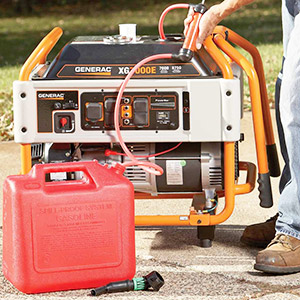
- Try to follow the generator maintenance routine recommended by the manufacturer.
- Use a cover for your generator so it cannot come with the direct connection of sunlight, water, and rain.
- Inspect and remove different worn parts of your generator.
- Make sure the generator housing area has a proper ventilation system.
- Check the fluid level along with the coolant and fuel.
- Only use the recommended fuels.
- Make sure the fuel tank is never empty before you switch on the generator.
- Keep the filters clean and change them when needed.
- Frequently check the control panel to ensure the accuracy of indicators and readings.
- Inspect wiring and cords of the generator periodically and change them if needed.
Note: In the above section, you have learned about the maintenance and servicing of a generator in brief. However, if you want to know more details on how do you maintain a generator, we have another helpful article here for you.
Frequently Asked Questions
What is the most efficient fuel for a generator?
Can a generator stand in the rain?
Can you refuel a generator while it is running?
How long can you run a generator continuously?
Do you have to turn off your main breaker when using a generator?
Check Out How to Choose a Generator
Final Remarks
Choosing the proper type of generator based on your needs is essential. Otherwise, you will have the worst experience, and your purpose will not be served. If you follow the instructions that we have described in this article on how to choose a generator, you will be able to pick the right one.

